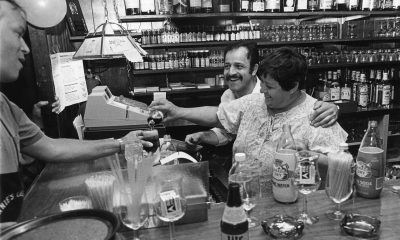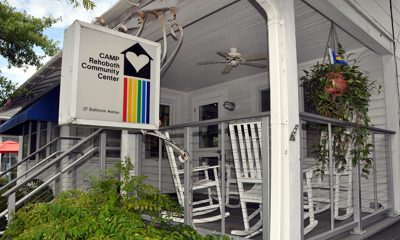Local
D.C. schools get incomplete score on LGBT youth survey
Low response rate means data not fully representative
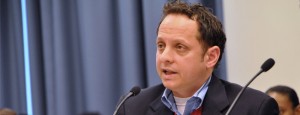
Adam Tenner, executive director of Metro Teen AIDS, said flawed data in the biennial Youth Risk Behavior Surveillance Survey will hinder his group’s work with local youth. (DC Agenda photo by Michael Key)
A survey of risky behavior by D.C. youth, including LGBT youth, was so flawed that its data cannot be weighted, hindering local groups as they work to help gay students and fight HIV.
Leaders of two groups that provide services to LGBT youth told a D.C. City Council hearing March 5 that the Office of the State Superintendent of Education, known as OSSE, failed to ensure a required 60 percent response rate for the survey among city middle and high school students.
That failure, the group leaders said, led federal officials to declare D.C. data for the biennial Youth Risk Behavior Surveillance Survey nothing more than a snapshot of student behavior rather than an indicator of trends.
Andrew Barnett, executive director of the Sexual Minority Youth Assistance League, and Adam Tenner, executive director of Metro Teen AIDS, said the loss would adversely impact their groups’ ability to assess the needs of LGBT youth.
“This gap in data presents a tremendous loss to SMYAL and the LGBTQ youth of D.C.,” Barnett told Council Chair Vincent Gray (D-At Large), who presided over the hearing. “We rely on the [survey results] to understand the scope of problems facing youth living in D.C.”
A spokesperson for the U.S. Centers for Disease Control & Prevention, which created and funds the survey, said the CDC conducts a national version of the survey by sampling about 15,000 high school students in schools throughout the country.
Karen Hunter, the spokesperson, said the CDC also arranges for states, counties and cities to conduct their own version of the survey using a set of “core” questions established by the CDC as well as additional questions deemed important by local jurisdictions.
At the recommendation of a coalition of local community groups, including LGBT organizations, D.C. school officials agreed to add a question to the 2007 survey that gave student respondents an opportunity to disclose whether they were gay, lesbian or bisexual.
In response to a recommendation of the same coalition, OSSE agreed to add another question for the 2009 survey enabling respondents to disclose whether they are transgender. The LGBT questions are expected to be part of all future surveys.
“This was incredibly important,” said David Mariner, executive director of the D.C. LGBT Community Center.
Mariner said that identifying LGBT participants in the survey enables the community to assess the problems LGBT youth face and develop ways to address those problems.
Among the core topics included in the survey questionnaire that seek to identify “health-risk behaviors among youth” are: unintentional injuries and violence, tobacco use, alcohol and other drug use, sexual behavior, unhealthy dietary behavior and mental health issues.
Mariner and Tenner said the lack of sufficient data from D.C. students in the 2009 survey creates a four-year gap in assessing the needs of local LGBT youth because the results of the next survey, set for 2011, won’t be processed and released until 2012.
Chad Colby, an OSSE spokesperson, said that although the office is in charge of coordinating the youth survey, it is administered by the city’s public school system. Colby did not know why school officials didn’t arrange for more students to take the survey. A school spokesperson could not be immediately reached for comment.
Colby noted that the survey was “in the field” before OSSE’s new director, Kerri Briggs, was appointed to her post as the city’s State Superintendent of Education last year.
A fact sheet he released about OSSE’s views on the survey also says that the survey is not legally mandated. “Therefore, school districts are not legally required to complete the survey,” says the fact sheet.
Colby said the lack of a 60 percent return of the survey questionnaires means the data cannot be “weighted,” precluding it from being compared against data from other cities and states. He noted that the data can still be used for some purposes.
“We’re still going to be reporting it as un-weighted data,” he said. “It doesn’t mean we won’t be able to use the data to make the case for grant funding. It just means you won’t be able to compare it to other states and districts.”
But Hunter said that un-weighted data only “provides a snapshot of what’s going on among the students that were surveyed.”
She said the data cannot be used to extrapolate the behavior of the entire student population. Only “weighted data,” which is obtained from a response rate of 60 percent or greater, can be used to assess the behavior of the larger population group, she said.
Tenner said CDC officials told him the D.C. survey response rate was 36 percent for high school students and 54 percent for middle school students.
“Many of us use the Youth Risk Behavior Survey for our programs and our grants,” Tenner said in an e-mail to local activists. “From a city-wide perspective, many of us were excited to use YRBS data to objectively measure the city’s effort to improve the health of its youth and to highlight the challenges that remain.”
He called on OSSE to present a written plan on how the agency will ensure that the 2011 survey is properly implemented “with adequate student and school participation.”
District of Columbia
Three of five LGBTQ candidates win race for DNC delegate from D.C.
32 candidates competed for 13 elected seats in party caucus
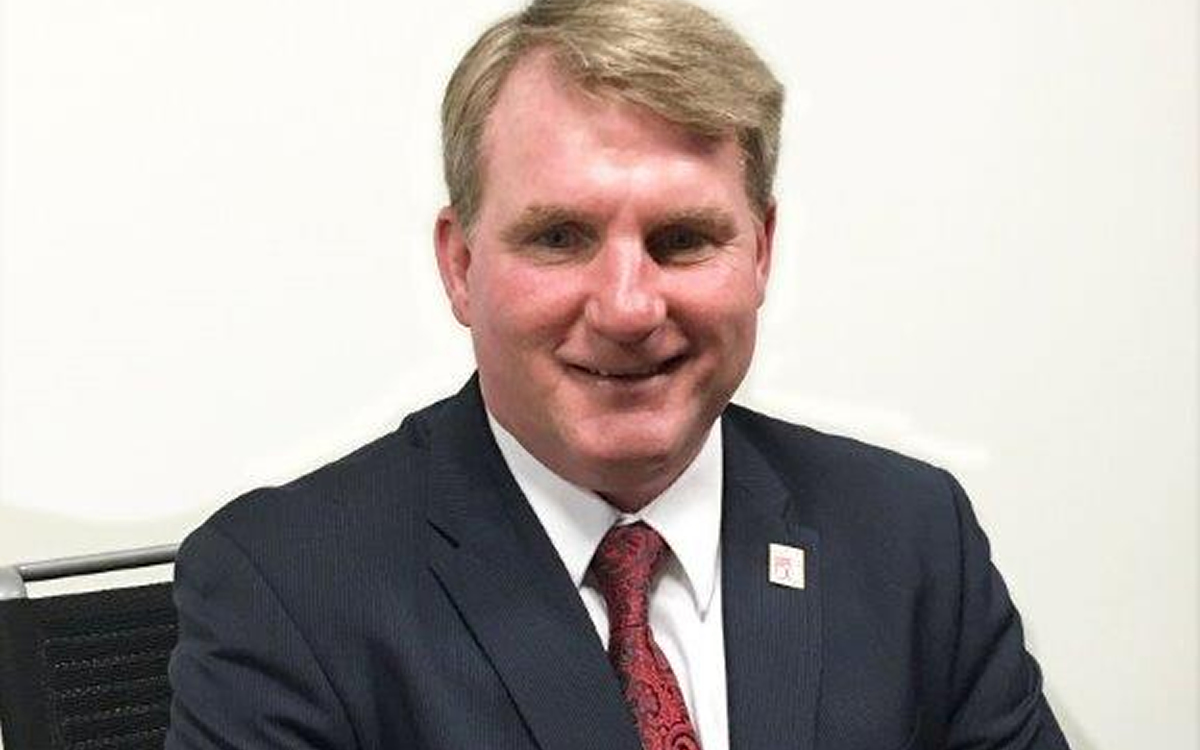
Three out of five known LGBTQ candidates running for election as delegates from D.C. to the Democratic National Convention won their races at an April 20 Democratic Party caucus election held at D.C.’s Walter Washington Convention Center.
Ward 2 gay Democratic activist John Fanning finished in first place with 140 votes and Ward 8 gay Democratic activist David Meadows finished in second place with 127 votes in a race in which six male candidates committed to supporting President Biden were competing for three male seats in a section of the city designated as Congressional District 1, which included registered Democratic voters in Wards 1, 2, 6, and 8.
Ward 7 gay Democratic activist Jimmie Williams won his race, finishing in third place with 200 votes in a race in which eight male candidates committed to President Biden competed for four male seats in the Congressional District 2 section of the city that included Wards 3, 4, 5, and 7.
Gay Democratic activist Felipe Afanador lost his race, finishing in sixth place with 47 votes in the Congressional District 2 election for male candidates backing Biden. It couldn’t immediately be determined which of the four wards in District 2 he is from.
The Washington Blade didn’t learn about Afanador’s status as an LGBTQ candidate until the Capital Stonewall Democrats announced it one day before the April 20 party election in an email statement.
In the Congressional District 2 race among female candidates, in which eight candidates competed for three female seats, transgender rights advocate and Ward 3 Democratic Party activist Monika Nemeth lost her race, finishing in sixth place with 49 votes.
The five LGBTQ candidates were among 32 candidates competing for just 13 elected delegate positions in D.C. D.C. will have a total of 51 delegates to the Democratic Convention, but the other 38 include elected officials and party leaders who are considered “automatic” or appointed delegates. The Democratic Convention will be held in Chicago Aug. 19-23.
Observers familiar with the April 20 party caucus election said Fanning, Meadows, and Williams had participated in local D.C. Democratic Party events and activities for a longer period than Nemeth and Afanador and appear to have been better known among Democratic voters in their respective wards as well as other wards. Those factors contributed to their receiving significantly more votes than most other candidates, observers have said.
In his candidacy statement posted on the D.C. Democratic Party website, Afanador said he worked on the 2020 Biden presidential election campaign in Pennsylvania. His LinkedIn page says in 2022 he began work in Washington for the Biden administration as an official in the U.S. Department of Agriculture.
Nemeth is a past president of D.C.’s Capital Stonewall Democrats, the city’s largest LGBTQ local political group, and has been an active member of the D.C. Democratic State Committee, the local party governing body. She served as a Biden delegate at the 2020 Democratic National Convention.
“It is important for our D.C. delegation to have strong LGBTQ representation,” Capital Stonewall Democrats said in its April 19 statement. “There are five LGBQ candidates running to be delegate, and Capital Stonewall Democrats asks that our members support each one,” the statement says.
“Unfortunately, they fell short, but they and all queer Democrats are welcome to attend and participate in convention events and activities sponsored by the national and local party,” Meadows told the Blade in referring to Nemeth and Afanador. “Our shared goal is to unite behind the Biden-Harris ticket to protect our LGBTQ rights from being dismantled by Donald Trump and the GOP,” Meadows said.
“Running for District Delegate is one of the most grassroots efforts,” Fanning told the Blade. “It’s very beneficial to align yourself on a slate with community leaders that have either previously run for District Delegate or have developed a constituency in their community from other civic engagements,” he said, referring to possible reasons for his, Meadows, and Williams’s election victory.
Aside from the D.C. elected LGBTQ delegates, two prominent D.C. LGBTQ Democratic leaders will be appointed as delegates to the 2024 Democratic National Convention in their role as members of the Democratic National Committee from D.C. They are Claire Lucas, a highly acclaimed Democratic Party and LGBTQ rights advocate and party fundraiser; and Earl Fowlkes, one of the lead organizers of D.C.’s annual Black LGBTQ Pride celebration and former president of the Capital Stonewall Democrats. Both are committed to supporting President Biden as the Democratic nominee for re-election.
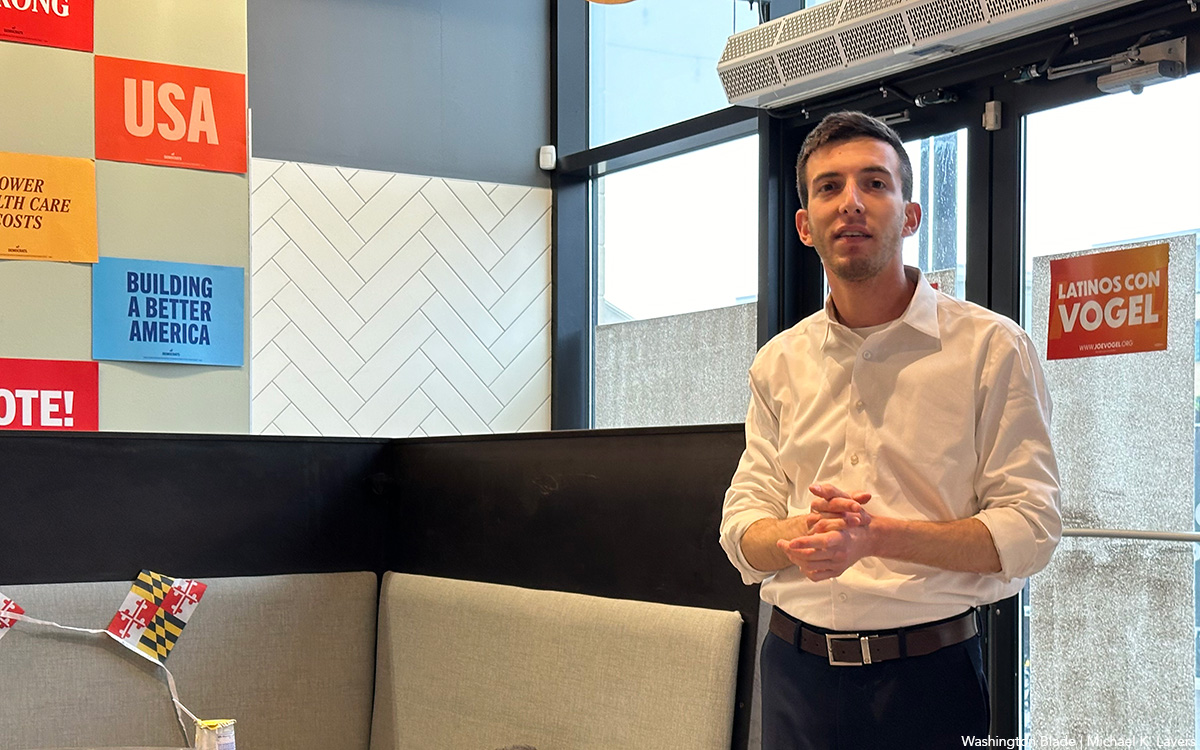
GAITHERSBURG, Md. — Maryland state Del. Joe Vogel (D-Montgomery County) on Friday held a “Big Gay Canvass Kickoff” event at his congressional campaign’s headquarters.
LGBTQ+ Victory Fund Vice President of Outreach and Engagement Marty Rouse and John Klenert, a member of the DC Vote and Victory Fund Campaign board of directors, are among those who participated alongside members of Equality PAC. Vogel spoke before Rouse, Klenert and others canvassed for votes in the area.
“Joe brings a fresh new perspective to politics,” said Gabri Kurtzer-Ellenbogen, deputy field director for Vogel’s campaign.
Vogel, 27, is among the Democrats running for Congressman David Trone’s seat.
Trone last May announced his bid to succeed retiring U.S. Sen. Ben Cardin (D-Md.) in the U.S. Senate.
The Democratic primary is on May 14. Vogel would be the first Latino, the first gay man and first Gen Zer elected to Congress from Maryland if he were to win in November.
“We need a new generation of leadership with new perspectives, new ideas, and the courage to actually deliver for our communities if we want things to get better in this country,” Vogel told the Washington Blade last month during an interview in D.C.
Maryland
Montgomery County police chief discusses arrest of trans student charged with planned school shooting
County executive tells news conference student’s trans identity is irrelevant to criminal charge
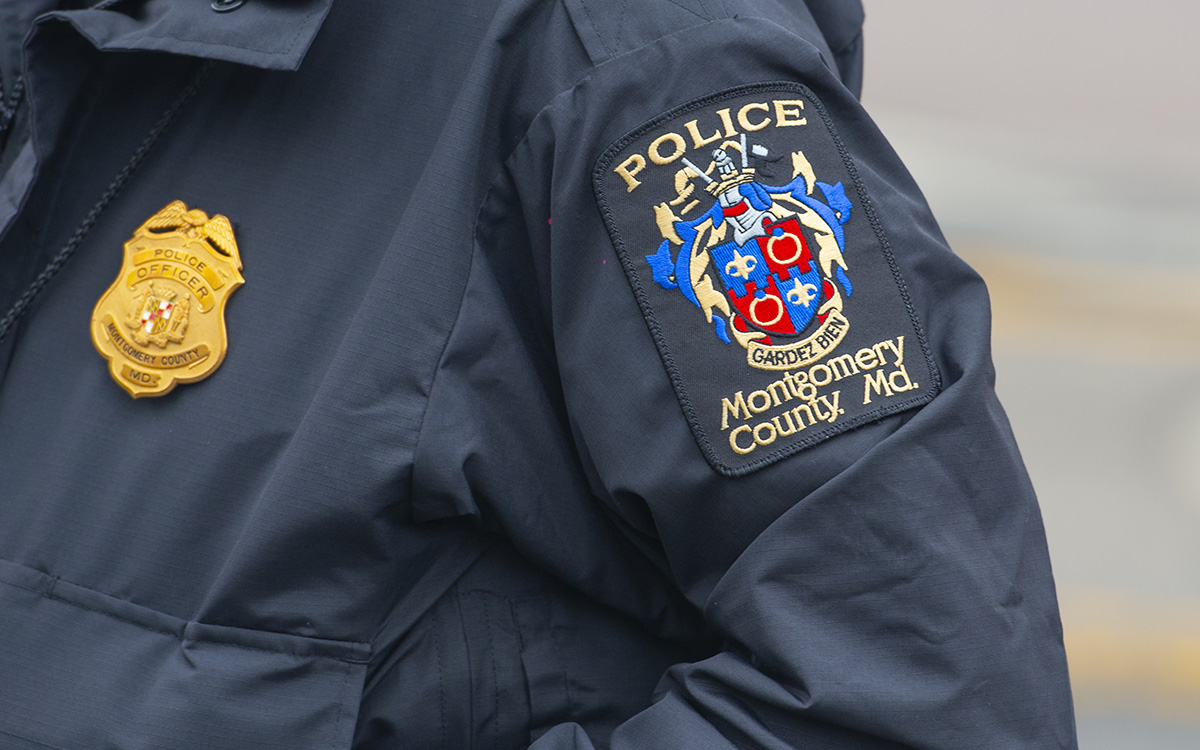
Montgomery County, Md., Police Chief Marcus Jones joined other county and law enforcement officials at a news conference on Friday, April 19, to provide details of the police investigation and arrest of an 18-year-old high school student charged two days earlier with threats of mass violence based on information that he allegedly planed a mass shooting at the high school and elementary school he attended in Rockville, Md.
In charging documents and in a press release issued on April 18, Montgomery County Police identified the arrested student as “Andrea Ye, of Rockville, whose preferred name is Alex Ye.”
One of the charging documents states that a friend of Ye, who police say came forward as a witness who played a crucial role in alerting authorities to Ye’s threats of a school shooting, noted that Ye told the witness that Ye identified as the transgender student he wrote about as a character in a 129-page manifesto outlining plans for a school shooting. Police have said Ye told them the manifesto was a fictional story he planned to publish.
At the news conference on Friday, Police Chief Jones and other law enforcement officials, including an FBI official and Montgomery County Executive Marc Elrich, referred to the student as Alex Ye and Mr. Ye. None of the officials raised the issue of whether Ye identified as a transgender man, seven though one of the police documents identifies Ye as a “biological female.”
County Executive Elrich appeared to express the views of the public officials at the news conference when one of the media reporters, during a question-and-answer period, asked Elrich why he and the others who spoke at the news conferment failed to “admit that this individual was transgender.”
“Because it’s not a lead,” Elrich replied, asking if the press and law enforcement authorities should disclose that someone arrested for murder is “a white Christian male who’s heterosexual.” Elrich stated, “No, you don’t – You never publish somebody’s sexual orientation when we talk about this. Why you are focusing on this being a transgender is beyond me. It’s not a news story. It is not a crime to be transgender.”
The reporter attempted to respond but was cut off by the press conference moderator, who called on someone else to ask the next question.
In his remarks at the press conference Chief Jones praised the so far unidentified witness who was the first to alert authorities about Ye’s manifesto appearing to make threats of a mass school shooting.
“Now, this is a situation that highlights the critical importance of vigilance and community involvement in preventing potential tragedies,” Jones said. “I commend the collaborative efforts of the Montgomery County Police Department, the Federal Bureau of Investigation, the Rockville City Police Department, and the Montgomery County Public Schools, as well as Montgomery County Health and Human Services,” he told the gathering.
“Thanks to their swift action and cooperation a potentially catastrophic event was prevented,” Jones said.
Jones pointed out that during the current school year, police have received reports of 140 threats to the public schools in Montgomery County. He said after a thorough investigation, none of them rose to the level where an arrest was made. Instead, police and school officials took steps to arrange for the student making the threats and their parents to take remedial action, including providing mental health services.
“But this case is different,” Jones said. “This case is entirely different that takes it to a different level. It was a concerned witness who brought this matter to light by rereporting the suspect’s manifesto to the authorities. This underscores the value of community engagement and the ‘see something say something’ approach,” he said.
Jones mentioned at the press conference that Ye was being held without bond since the time of his arrest but was scheduled to appear in court for a bond hearing on Friday shortly after the press conference took place to determine whether he should be released while awaiting trial or continue to be held.
In his manifesto obtained by police, Ye writes about committing a school shooting, and strategizes how to carry out the act. Ye also contemplates targeting an elementary school and says that he wants to be famous.
In charging documents reported on by WJLA 7 and WBAL 11, the 129-page document, which Ye has referred to as a book of fiction, included writings that said, in part:
“I want to shoot up a school. I’ve been preparing for months. The gun is an AR-15. This gun is going to change lives tomorrow … As I walk through the hallways, I cherry pick the classrooms that are the easiest targets. I need to figure out how to sneak the gun in. I have contemplated making bombs. The instructions to make them are surprisingly available online. I have also considered shooting up my former elementary school because little kids make easier targets. High school’s the best target; I’m the most familiar with the layout. I pace around my room like an evil mastermind. I’ve put so much effort into this. My ultimate goal would be to set the world record for the most amount of kills in a shooting. If I have time, I’ll try to decapitate my victims with a knife to turn the injuries into deaths.”
-

 District of Columbia5 days ago
District of Columbia5 days agoNew D.C. LGBTQ+ bar Crush set to open April 19
-

 South America3 days ago
South America3 days agoDaniel Zamudio murderer’s parole request denied
-

 Maryland4 days ago
Maryland4 days agoMontgomery County police chief discusses arrest of trans student charged with planned school shooting
-

 Politics5 days ago
Politics5 days agoCourt records raise concerns about right-wing TikTok investor’s influence



